RT and Sputnik Spin Narrative on Guaidó’s Attempt to Take Power in Venezuela
Kremlin-backed media engaged in selective coverage of the events on the ground and online
RT and Sputnik Spin Narrative on Guaidó’s Attempt to Take Power in Venezuela
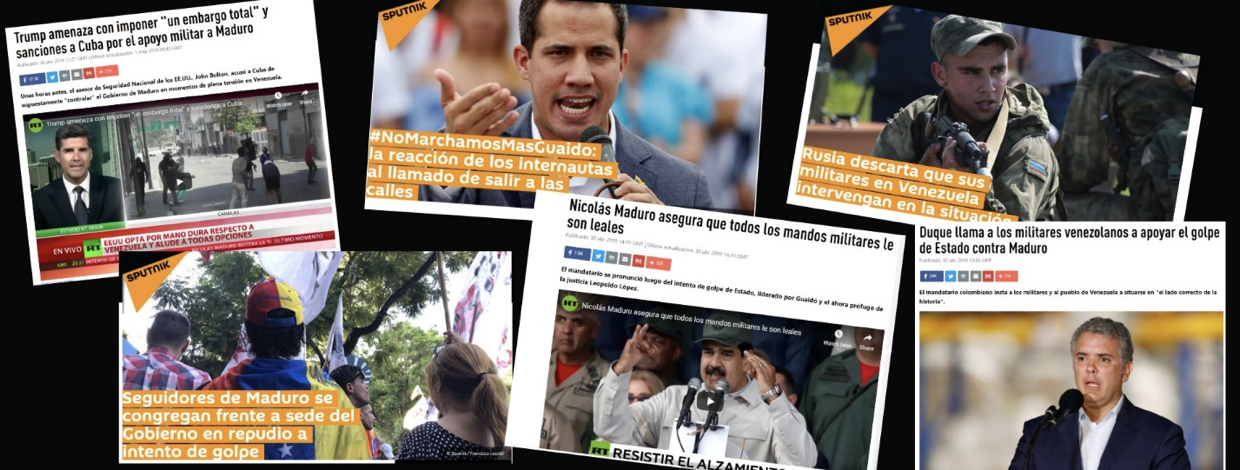
BANNER: (Source: @luizabandeira/DFRLab via RT and Sputnik)
Several hashtags began trending in Venezuela on April 30, the day opposition leader Juan Guaidó, who is recognized by more than 50 countries as the country’s interim president, tried to oust Nicolás Maduro. The hashtags included #OperacionLibertad (Operation Freedom) and #TodaVenezuelaALaCalle (All Venezuela to the streets). Readers of the Spanish version of the Kremlin-backed outlet Sputnik, however, only read about one hashtag: #NoMarchamosMasGuaido, or “We won’t march with Guaidó.”
Kremlin-owned media outlets — namely Sputnik and RT — have become more popular in Venezuela in the past year, and their coverage of the country has not been impartial. On April 30, these outlets branded Guaidó’s efforts to oust Maduro a “coup” without acknowledging the complexity of the situation. Both Sputnik and RT failed to report on the repression and human rights abuses inflicted by government forces and kept silent on the government’s blockage of online platforms, such as Twitter and YouTube, that the public used to keep abreast of the latest developments.
Maduro’s regime is a close political ally of Russia, and Kremlin-owned outlets often parrot its unsubstantiated claims and narratives. Both RT and Sputnik have been accused of spreading disinformation and serving as “Russian propaganda machines” in various contexts. In 2012, the former editor-in-chief of RT declared that the broadcaster was engaged in an “an information war,” demonstrating that RT does not serve a journalistic objective but, rather, a propagandistic one. In the United States, RT and Sputnik are registered as foreign agents under the Foreign Agents Registration Act (FARA).
April 30 in Venezuela
In the early hours of April 30, Juan Guaidó appeared in a video taken near La Carlota, a military base in eastern Caracas, alongside Venezuelan opposition leader Leopoldo López –who until that moment had been under house arrest — and several military officials. Guaidó claimed to have the support of the Armed Forces and said that day marked the final phase of Operation Freedom. The military’s support for Guaidó, however, was more modest than expected.
As of May 24, Maduro remained in power, with Guaidó continuing to lead opposition protests.
Coverage of April 30
On April 30, RT and Sputnik published 85 articles about the uprising in Venezuela, 33 of which used the words “golpe” or “golpista” (“coup”) in the headline.

The use of “coup” to describe events in Venezuela is controversial. “Coup” is usually defined as an illegal action, but some have argued that Maduro lost the legitimacy to govern between his 2017 power grab, when his hand-picked Supreme Court stripped the National Assembly of most of its legislative authority, and the allegations of election fraud in 2018.
Under this premise, Guaidó has not been promoting an illegal coup to take power from a legitimate government but, instead, has acted to restore democracy in the country. In addition to the Kremlin-backed media, some American outlets, namely CNN, also used the term “coup” to describe the situation in Venezuela. Calling the event a “coup” without acknowledging the complexity of the situation was a failure to provide balanced journalism.
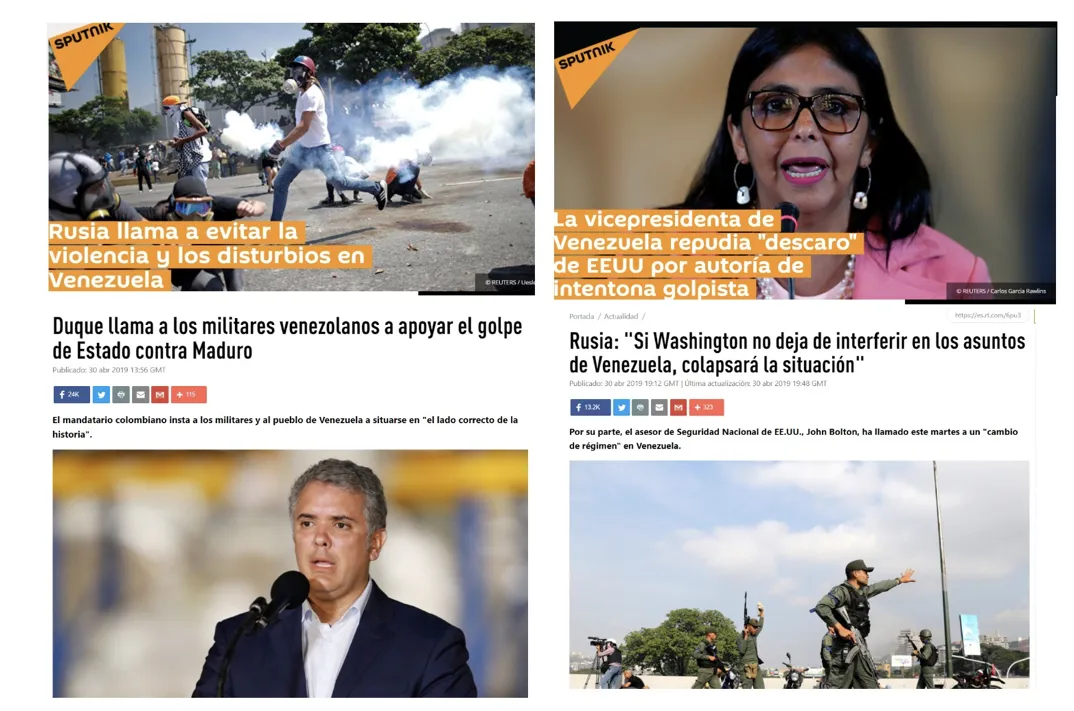
RT and Sputnik published 48 articles on April 30 referring to other countries in their headlines, reflecting the importance these outlets place on the internationalization of the dispute. The outlets characterized the United States and Colombia as the orchestrators of Guaidó’s uprising, usually by presenting statements from Maduro regime officials or allied pundits.
In contrast, they characterized Russia’s role in the conflict as that of a neutral peacekeeper, claiming that the Kremlin had implored the people of Venezuela to refrain from violence and stating that Russian military in Venezuela would not intervene in the situation. Finally, RT and Sputnik also highlighted the international support from Maduro-allied countries. Most of this support came from authoritarian countries such as Cuba, Turkey, and Nicaragua.
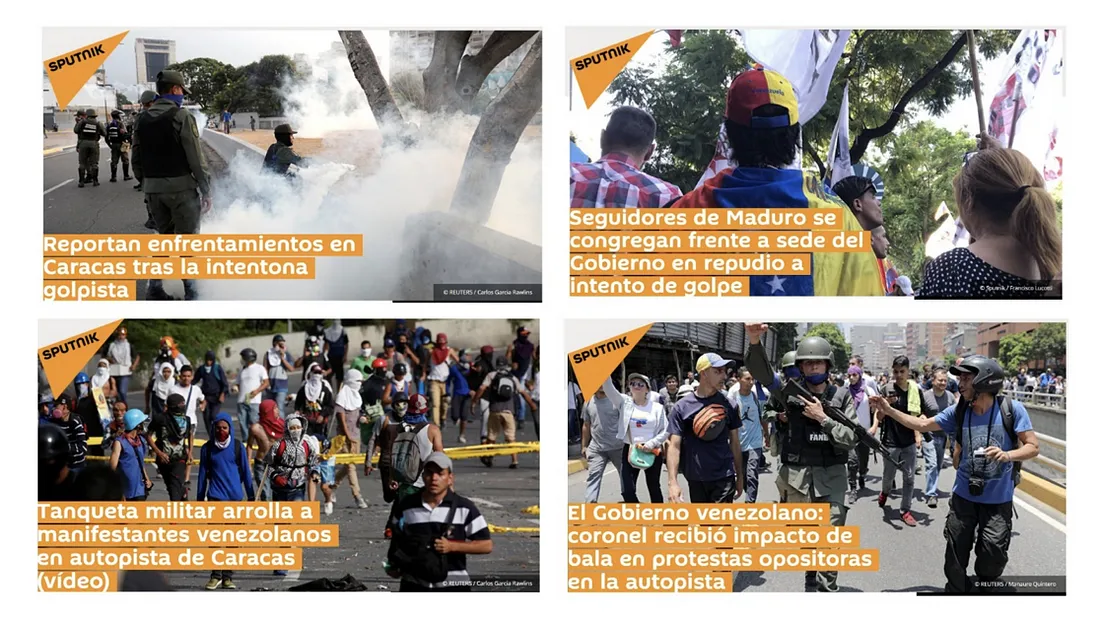
Coverage of the protests, as a component of the overall events around the uprising, was lacking in RT and Sputnik; when they did appear, the coverage was biased in favor of Maduro. RT published only one article about the protests and did not mention that opposition supporters had suffered injuries at the hands of forces loyal to Maduro. At one point, a government military truck ran over a handful of Guaidó supporters. Sputnik published a video of the incident, as well as an article that focused on the injuries sustained by one member of the military forces, based on the Maduro’s regime account of the incident. In general, RT’s and Sputnik’s headlines highlighted the number of pro-Maduro supporters in the streets and minimized that of Guaidó supporters.
Reports on the status of the online information environment concerning Venezuela on that day were also misleading. First, there was no mention of the Maduro regime’s blockage of websites and social media services. According to NetBlocks, the Venezuela state provider CANTV restricted access to Twitter, Periscope, YouTube, Facebook, and other services on April 30. Second, the only article published about the online debate was about the pro-Maduro hashtag #NoMarchamosMásGuaidó. Sputnik claimed the hashtag was among the most used of the day in Venezuela, but it was not in the trending topics of the day, according to TrendoGate, a tool that monitors trending topics on Twitter. #NoMarchamosMásGuaidó had in fact garnered fewer mentions than other hashtags used on the same day.

RT and Sputnik in Venezuela
As the DFRLab reported previously, both RT and Sputnik have expanded their presence in Latin America over the last few years. Currently, the Spanish-language version of RT, Actualidad RT, has more than 7 million likes on Facebook, outperforming the English-language page, which has 5 million likes.
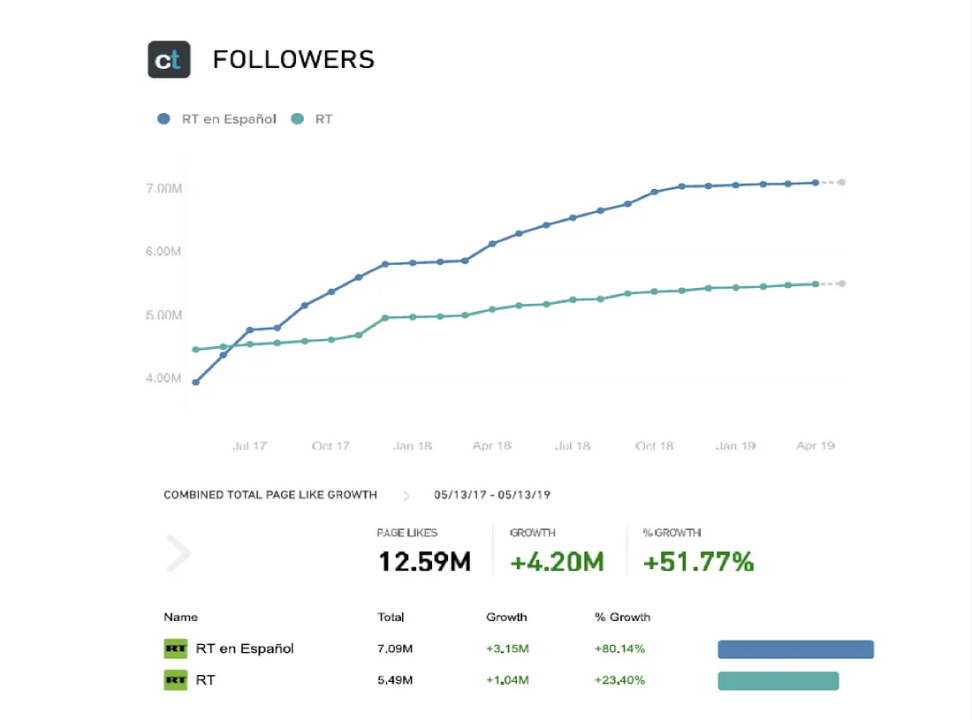
While RT Actualidad is becoming more popular on Facebook, overall visits to its independent website in Latin America have been relatively stable since last year. In February 2018, the page had 31 million non-unique visitors per month in average, according to SimilarWeb. While this number peaked at 38 million monthly non-unique visitors in November 2018, by April 2019, however, the page had dropped back to an average of 31 million visits per month.
Meanwhile, the percentage of visits to Actualidad RT from Venezuela have increased significantly since February 2018, when visitors from the country accounted for 9.8 percent of readers. Today, Venezuelan visitors comprise 14.98 percent of the total.
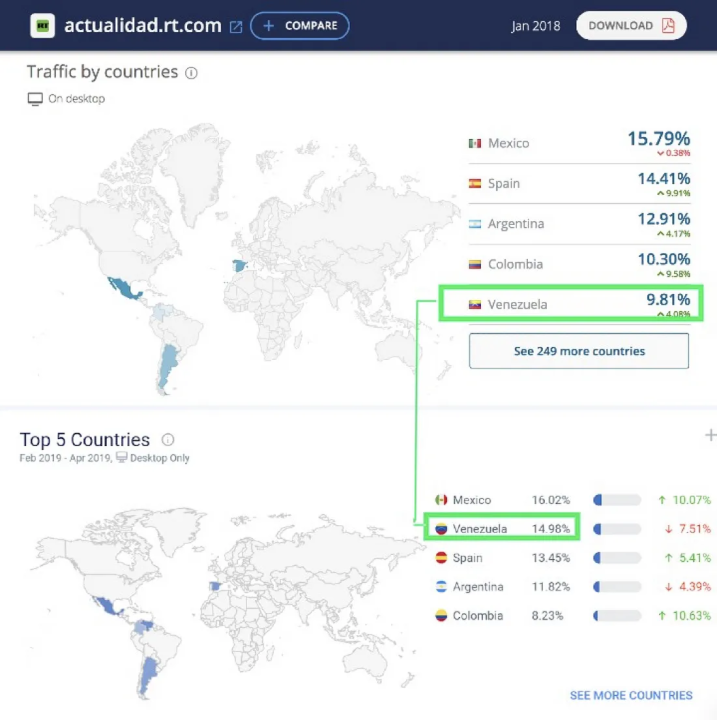
Although Sputnik Mundo, the Spanish-language version of Sputnik, garnered less internet traffic than did Actualidad RT, the former has substantially grown its audience over the past year, from a monthly average of 5.4 million to 7 million non-unique visits. Furthermore, traffic to the site from within Venezuela has also increased. In February 2018, Venezuela was not among the top five countries accessing Sputnik Mundo. In May 2019, however, it was the second-most popular country from which people accessed the website.
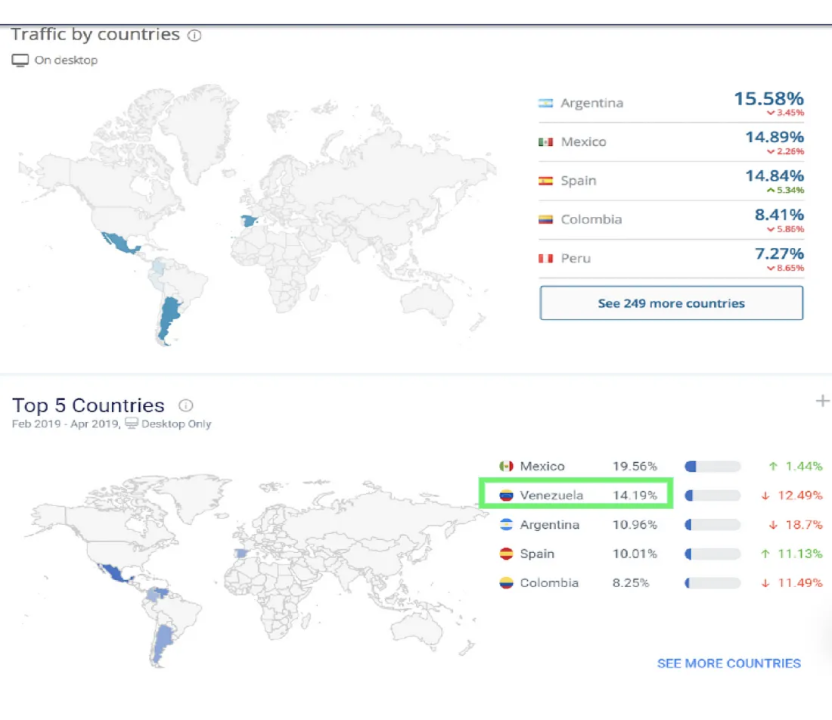
The combined audience growth within Venezuela of the Spanish versions of RT and Sputnik over the past 15 months suggests that their reach and influence is expanding in the country.
Register for the DFRLab’s upcoming 360/OS summit, to be held in London on June 20–21. Join us for two days of interactive sessions and join a growing network of #DigitalSherlocks fighting for facts worldwide!

